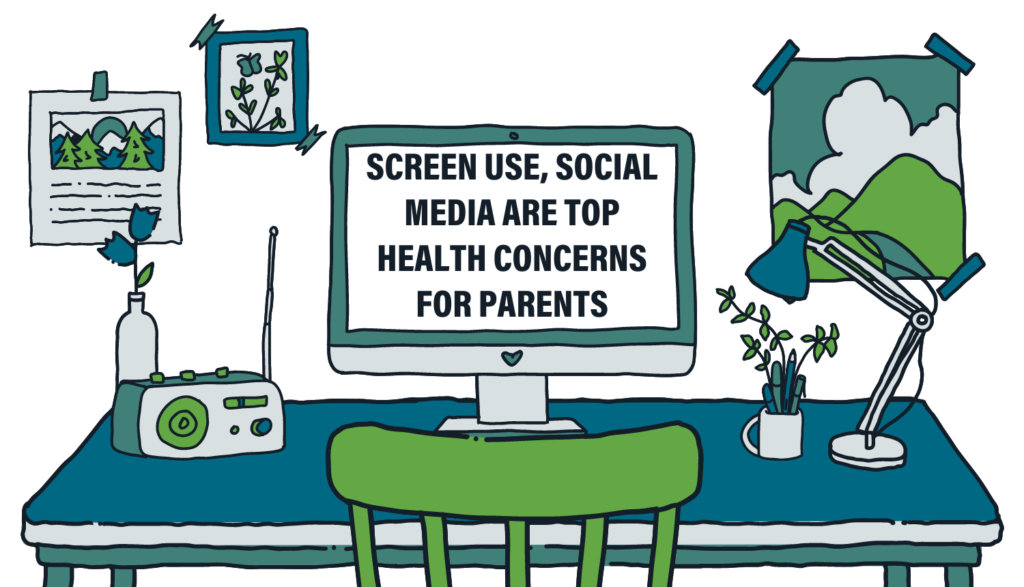Screens are amazing. They bring us entertainment, show us news and keep us connected with far-flung friends and family. Why, you’re using a screen right now.
But if used too much or in the wrong way, screens can be terrible. Or, at least, that’s what parents say.
The C.S. Mott Children’s Hospital has periodically asked parents nationwide what their biggest health concerns are regarding their kids. And this year, their National Poll on Children’s Health found that those worries centered on screens.
More than two-thirds (67%) of moms and dads said that their children’s “overuse of devices/screen time” was a huge area of concern. Social media came in at a very close second, with 66% of parents naming that as a worry. About 62% of parents were wringing their hands over the issue of internet safety.
Yep, the top three parental worries were all centered on screens.
That’s pretty fascinating, especially given what the Mott poll uncovered just a decade earlier. Back then, parents were worried, in order, about childhood obesity; drug abuse; and smoking/tobacco use. Indeed, obesity had been the poll’s longtime “winner” for several years. This year? Obesity didn’t even rank in the top 10.
But there’s more: Many parental pain points that would seem to have nothing to do with screens are actually quite connected to them, too.
For instance: We all know that mental health is a growing concern for all Americans, but particularly among children and teens. That concern was reflected in Mott’s study. About 57% of parents aid that depression and suicide were huge worries for them. More than half were worried about their children being stressed or anxious.
What’s causing all that stress and anxiety? That varies widely, of course, but some of it may come from what kids consume on their screens. Researchers have found connections between screen time and mental-health issues. Experts believe that social media in particular—by encouraging constant online comparison among teens—is linked to both anxiety and depression.
The poll’s No. 5 issue, bullying (at 53%), has some obvious links to screens as well. Cyberbullying is a huge issue these days, often going hand in hand with real-world bullying. And while bullied kids of the past were often safe once they came home from school, today, there’s no escape. The bullies lurk on social media and spread their vitriol via text and IM and TikTok, exponentially increasing a child’s anxiety and fear and, sometimes, despair. And sometimes, as Emily Tsiao noted in a recent blog, social media can become a conduit to turn our own children into cyberbullies themselves.
Indeed, we’ve covered the links between our screens and mental health a ton at Plugged In—both in this blog and on our podcast. Why? Because Plugged In is concerned with the overuse and impact of screens on kids, too. Keeping parents informed—and helping them navigate this bewildering technocentric world we live in—are among our primary objectives.
There are no easy fixes to these worries, of course. If there was such a thing as a screen-time cure-all, your kids could simply be treated and cured. No, these screen-related worries won’t vanish with a wave of a smartphone. But you can instill some common-sense curbs in your kids’ screen use. Here’s just a few:
- Keep phones out of your kids’ bedrooms. I know that many use their phones as alarm clocks, but they also can be tempted to check their devices at all hours of night or morning, resulting in lost sleep and putting themselves at risk for higher rates of anxiety and depression.
- Create phone-free spaces and/or times in your house. No texting between 6 and 8 p.m., for instance, or no phones in the kitchen. Freeing time and space not only helps cut down on screen time, but it helps to foster face-to-face conversations with your children as well.
- And always, cultivate an atmosphere in your family where your children feel comfortable talking to you about anything—including what they might see or experience online. Keep the lines of communication open, and always look for opportunities to reinforce your family’s values. Even when you think that your kids aren’t listening to you, they are.
These screen-based worries aren’t going anywhere. They’ll be with us as long as screens themselves are, and they’ll likely continue to grow. But parents are not powerless. They can push back on those influences and help protect their kids. And, as always, Plugged In will do what it can to help.







One Response
-I’m glad these parents are concerned. Part of being a parent means you are concerned who your child is, and what they will become.